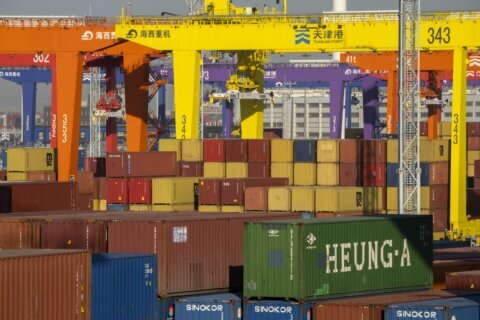DUBAI, United Arab Emirates (AP) — Afghanistan’s Embassy in Oman has reopened, an official in Kabul said Tuesday, the latest sign of the growing inclusion of the Taliban among Gulf Arab countries following the United Arab Emirates’ acceptance of a Taliban ambassador last month.
The development also comes after the Taliban said in July that they no longer recognize diplomatic missions set up by the former, Western-backed government. Most countries still have not accepted the Taliban as Afghanistan’s legitimate government.
According to Zia Ahmad Takal, deputy spokesman of the Foreign Ministry in Kabul, the embassy in Muscat, Oman’s capital, resumed operations on Sunday.
There was no immediate confirmation from Omani authorities and no reports from the sultanate’s state-run news agency about the embassy’s reopening.
“The work of the embassy is carried out regularly by diplomats of the Foreign Affairs Ministry of the Islamic Emirate of Afghanistan,” said Takal, using the Taliban name for their government.
“The resumption of embassy activities in cooperation with the host country will play a constructive role in strengthening the political, economic, social and religious relations between Kabul and Muscat,” Takal added.
The Foreign Ministry said that 39 diplomatic missions are now under Taliban control.
There is a deepening divide in the international community on how to deal with the Taliban, who have been in power for three years and face no internal or external opposition. And even though the Taliban and the West remain at loggerheads, Afghanistan’s rulers have pursued bilateral ties with major regional powers.
Last month, Uzbek Prime Minister Abdulla Aripov arrived in Afghanistan in the highest-level visit by a foreign official since the Taliban seized power in Afghanistan in August 2021.
As part of expanding their reach, the Taliban have moved to take control of the country’s embassies and consulates overseas.
The embassies in London and Oslo announced their closures this month, while others in Europe and beyond have continued to operate.
Oman has maintained a strict neutrality, often acting as a go-between for Sunni Muslim powerhouse Saudi Arabia and its regional rival, Shiite-majority Iran. Most of Oman’s population are Ibadi Muslims, a more liberal offshoot of Islam predating the Sunni-Shiite split.
Copyright © 2024 The Associated Press. All rights reserved. This material may not be published, broadcast, written or redistributed.






